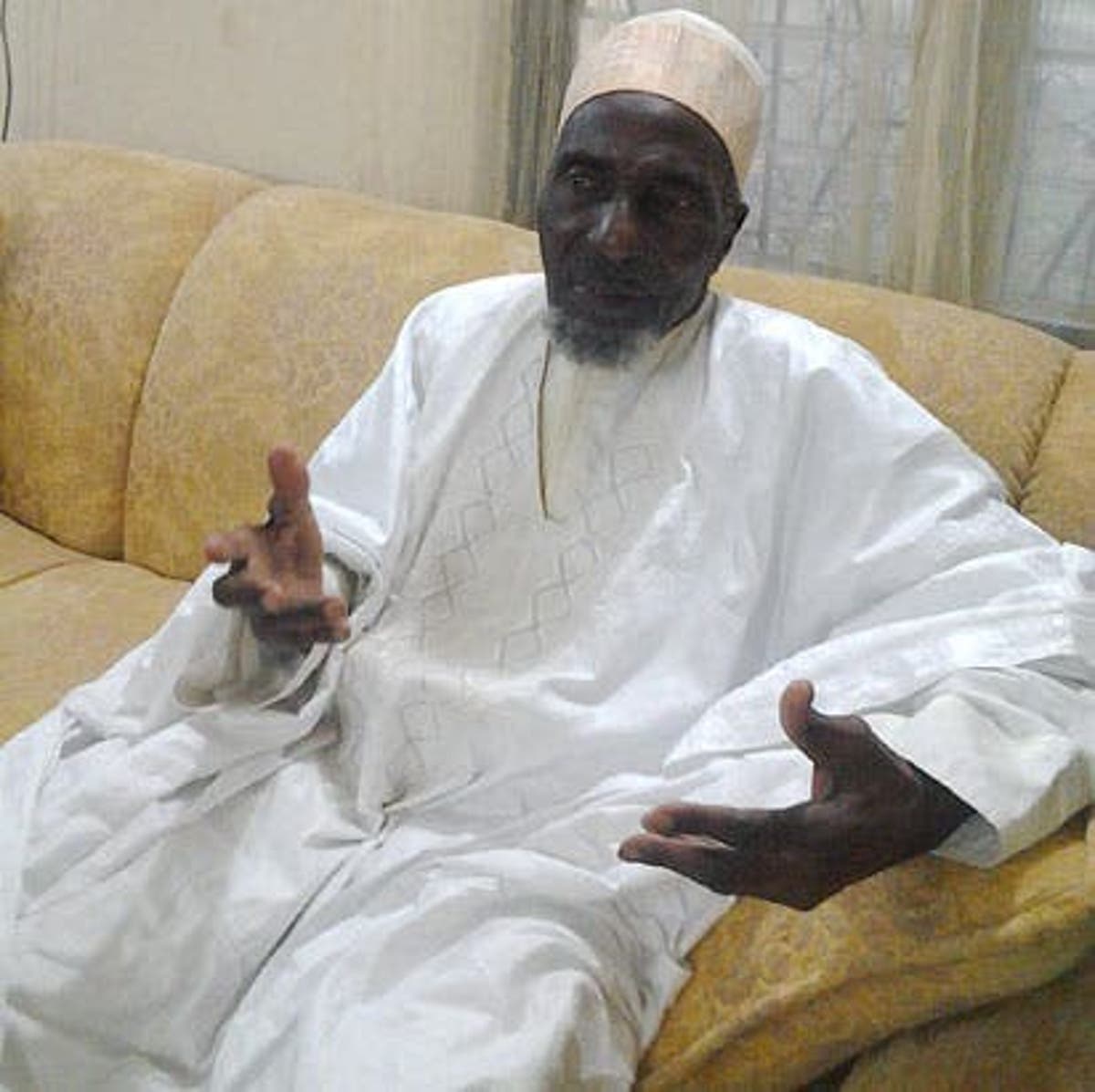In the photograph were two teary-eyed old men, one in a pale-blue embroidered cloak and the other, a little taller and white, in a long-sleeved shirt of matching shade of blue, holding tight to each other. Both were in the twilight of their time, and their embrace almost seemed like an effort to support their frail frames. Only that it was the final goodbye of two friends who had known each other for half a century. The powerful photograph, which went viral last week on the passing of the man in blue, Sheikh Ahmed Lemu, struck the emotion of sympathizers because of the contrasting identity of the other man—Reverend Father Jeremiah Dermot O’Connell, an Irish Catholic priest and school administrator.
The occasion was the Sheikh’s visit to the man fondly called “Father” in 2017 to bid him farewell, and the video of the embrace shows the Sheikh saying, “May Allah reward you for all that you’ve done for this nation.” Father, who could also communicate in the Sheikh’s Nupe language, retired after over 50 years as the longest-serving principal in Niger State and had been persuaded by his Irish kinsmen to return to his country of birth to spend the rest of his days, which ended on March 14, 2018, at 85.
- Has corruption finally killed Nigeria?
- Change in value system put us in trouble – Former minister, Sai’d
The symbolism of that emotional embrace with a Christian missionary who dedicated his life to promoting a religion the first-rate Muslim scholar existed to disprove in favour of Islam, has been the motif of eulogies in honour of the Sheikh who passed away at 91. The two foremost residents of Minna called to the ways of their religion from the same city, and in over five decades of their “Da’wah” or evangelism, they demonstrated the possibility of two faiths functioning in the same space without friction. They began as missioners and teachers and evolved into legends, around whom various generations of believers, ideologues, thinkers, scholars, scientists and policymakers were moulded.
Educated at the distinguished School of Oriental and African Studies (SOAS), London, after years of learning the Qur’an, Sheikh Lemu’s cosmopolitan worldview and marriage to a British convert, prepared him for a world threatened by double-edged extremism. He dazzled his followers and students in resisting the two extremes of the Western-led liberal establishment and his fanatic contemporaries as a bureaucrat, school teacher, jurist, preacher and author of dozens of instructional books that interrogate and fertilize the mind of young Muslims.
Distancing himself from the ideological infighting that erupted as sectarian rivalries in Northern Nigeria, notably between the Sufi votaries of Tijaniyya – Qadiriyya order and the self-asserted Salafi ideologues under the banner of Jama’at Izalat al Bid’a Wa Iqamat as-Sunna, or simply Izala, and between the latter and the Shiites, Sheikh Lemu redirected our attention to his books on topical issues to disabuse the mind of the straying Muslim. In 1969, aware of rippling tension among Muslims in Nigeria, he co-founded the influential Islamic Education Trust (IET) as an umbrella for unifying Muslims and propagating Islam, and with branches in Abuja, Yola, Sokoto and Lagos, and liaison offices in Bauchi and Birnin Kebbi.
The IET complex spelt out Sheikh Lemu and wife’s wisdom in identifying the moral upbringing of Muslim kids in the Western school system, especially children of the Muslim elite, as instrumental in sanitizing the society. The schools, built on integrating Islamic and Western education curricula, comprise New Horizons College, Minna; Model Islamic Nursery and Primary School, Minna; Sunrise International School, Asokoro, Abuja; and IET Model School, Sokoto. When the Sheikh embarked on setting up the schools, a close confidante shared, he was uncertain of the fund to complete the project. He banked on his vast networks and intellectual integrity to win the trust of donors across the world.
Sheikh Lemu’s first book, The Young Muslim, which was also a recommended text for secondary school students, was the rite of passage in learning the basics of Islam for kids who came of age in the 1980s and the 1990s. Along with his wife, Hajiya Bridget Aisha Lemu, the Sheikh authored several books in English and Hausa through by IET-owned Ilmi Bookshop. The best-selling texts were embraced across sects, and so lucidly written, they were akin to interacting with one’s favourite uncle and auntie.
The political elite, also, weren’t pathologized and threatened to be cast into hellfire without any chance of redemption in the Sheikh’s sermons, as is the practice by sect-baiting clerics. He built a sanctuary, instead, to train the young heirs of Nigeria’s political enterprises. He spoke truth to power, and yet kept the political class close, and that delicate balance set him apart as a model in moderation.
Unsurprisingly, he was consulted by various governments and international organizations. In Nigeria, he was a part of the aborted Vision 2010 economic plan projected by the Abacha administration, a committee on political reform set up by President Yar’adua, and the Presidential Committee on the 2011 Election Violence and Civil Disturbances under President Jonathan. None of these committees had their findings adopted, and that underlines the fault-line in a personalised governance system that’s consumed the breed of citizens who set out to make a difference.
On Twitter, Asiya Rodrigo, who has also worked at IET, remembered what Sheikh Lemu often shared as the hindrance to Nigeria’s progress, and the three-part diagnosis provides compressive insights into the man’s thinking: one, ignorance and poor moral upbringing; two, rulers and politicians with an insatiable lust for power and money; three, religious clerics who seek influence and popularity. One doesn’t have to look too far to unmask the characters who fit into these frames of an indictment.
As a pioneer Muslim influencer in Nigeria, one privileged to have the attention of the West and the East, Sheikh Lemu could’ve weaponized his celebrity status to puppeteer the political elite and be a part of their electoral conspiracies, but he deprived them of such partnership to ride on his coattail for relevance. Aside from refusing to trade his influence in the Nigerian political market and knocking back sectarian affiliation, he was absent in the proxy war between Shiite and Sunni scholars instrumentalized by Iran and Saudi Arabia despite his Sunni leaning and Saudi connections.
The foundation laid by Sheikh Lemu is the vaccine most needed as the Muslim world descends the slope of sectarian rivalries, which have recorded more deaths than converts. In a society where the popularity of clerics had nestled in humiliating those they disagreed with and mobilizing a flock of brainwashed followers to do the same, the Sheikh, through his sermons, schools and books, invited to the way of Islam with wisdom and kind advice, as the Qur’an admonishes. The beneficiaries are all of us taught to only debate with our opposers through comparison of ideas instead of weapons. The biggest beneficiaries, ironically, are the same political elite his colleagues either insult for attention or seek for political patronage, for they have inoffensive instructional books at their disposal and distinguished Islamic schools for their children.
Perhaps the most befitting profile of the Sheikh was his citation on receiving the King Faisal Prize in 2014, as the only Nigerian to attain such honour after Sheikh Abubakar Mahmud Gumi in 1987. “He is a composed intellectual, a devout Muslim,” it said. “(A)nd an advocate of moderation, justice and open-mindedness.” This emphasis on his moderation from a country in a flustering dilemma of defining what is “moderate” in the war against two extremes, is another lasting gift Sheikh Lemu has left behind to guide our diversity.

 Join Daily Trust WhatsApp Community For Quick Access To News and Happenings Around You.
Join Daily Trust WhatsApp Community For Quick Access To News and Happenings Around You.


